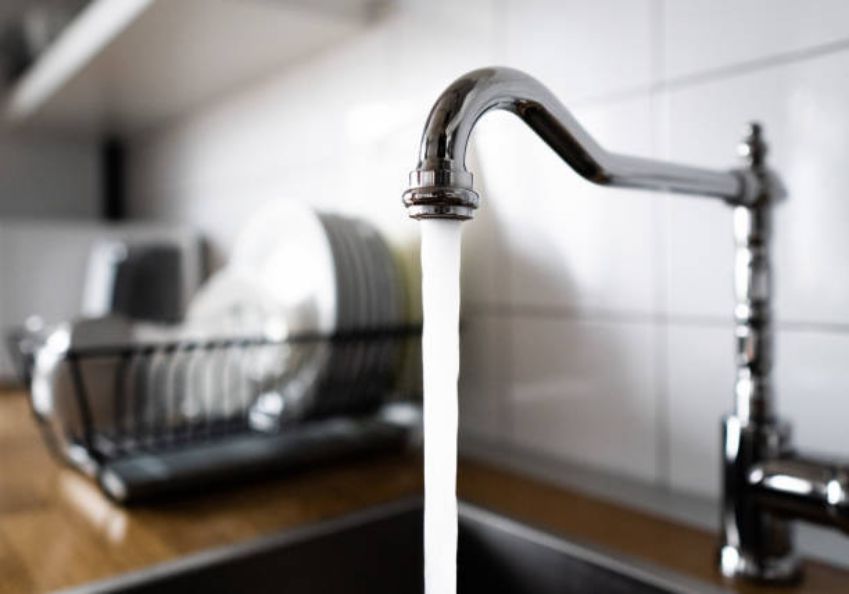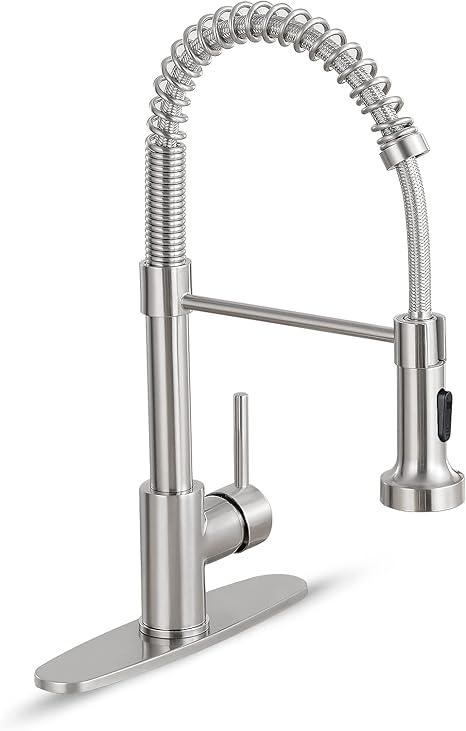When you’re moving to a new place or updating your bathroom, the inevitable question arises: “How should I get rid of the old faucet?”
There are several options, but whether or not it is recyclable is the most important. Kitchen faucets can become rusted, discolored, or otherwise unappealing over time. As a result, owners want to know how to replace them responsibly.
Table of Contents
Are Kitchen Faucets Recyclable?
Almost all kitchen faucets, particularly those made of metal, are recyclable. Plastic faucets can be recycled as well. The faucet’s recyclable status is determined by its materials, but there is a solution for every type of faucet. It will be able to find a home at the appropriate recycling center.

Metal, which is a highly recyclable material, is commonly used in kitchen faucets. Scrap yards and recycling centers frequently accept scrap metal. Toxic chemicals can be released into the soil when metal is discarded in a dump or landfill. As a result, recycling is encouraged.
Plastic is less recyclable than metal due to its toxic components. However, there are some do-it-yourself solutions available. The local recycling center may be able to repurpose this plastic. Plastic is non-biodegradable, which means it takes thousands of years to decompose. Reusing as much plastic as you can help the environment.
What Kinds of Faucet Fixtures Can Be Recycled?
Most metal faucets, as a rule, are recyclable. However, when it comes to plastic, you must do some research.
Brass is the most commonly used metal fixture in the kitchen sink. Brass is a long-lasting faucet metal composed of copper, tin, zinc, and lead. Brass’s resistance to water-based corrosion makes it ideal for faucets. Because of its resistance, it is also desirable for recycling.
Scrap metal collectors will pay a higher price for it. However, the alloy may contain impurities or have lower levels of desirable metals. This will have an impact on its resale value.
For faucet recycling, stainless steel is on par with brass. The metal is corrosion-resistant, but it is also a nickel alloy. Nickel is an excellent material for repurposing. This includes faucets with brushed nickel finishes.
Because of their elegant design, gold faucets are popular. They are also compostable. However, you should not expect a high return on your investment. Because gold is less durable than our alloys, it is less useful as a sink material. Not to mention the cost of the gold faucet. As a result, the gold kitchen faucets you see are frequently simply coated and lacquered with varnish.
When it comes to the recyclability of kitchen materials, plastic is at the bottom. When burned, it can emit harmful chemicals and does not decompose. It is typically only collected by specific recycling centers, so check with your local ones to confirm. Making recycling a fun home project is another way to recycle. Kids will enjoy painting over it. The brightly colored faucet can be transformed into a beautiful work of art.
What Faucet Material Can Not Be Recycled?
Some plastic faucets cannot be recycled.
Ceramic cartridges are rarely recycled. The piece is too small, and many curbside recycling programs will not accept it. Cartridges are the internal components of faucets that allow you to separate hot and cold water. Metal, plastic, and ceramic are common materials for these.
What Faucets Can Be Recycled?
Recyclable kitchen faucets include the following:
Brass, Stainless Steel, Brushed Nickel, Coated Metals (including gold), and plastics.
Is it possible to recycle a stainless steel sink?
Stainless steel sinks can be recycled in a variety of ways. Because of the nickel in the alloy, they fetch a good price at scrap yards. Nickel and old stainless steel, in general, will be reborn as new nickel-containing stainless steel.
Here’s how to get the most out of your stainless steel sink recycling:
- Remove the outer stainless steel ring.
- Remove the drain from the bottom of the sink.
- Removing the brass drain is also a good idea.
- Remove any rubber or caulk.
- Pound the sink with a hammer and chisel to create scraps.
- Take the individual metal components and scraps to a scrap yard.
Is it possible to recycle a cast-iron sink?
Sinks made of cast iron are highly recyclable. Iron is one of the primary metals in steel alloys, so scrap yards are always interested in cast iron. This iron may find a new application in steel alloys.
However, cast iron sinks are typically heavy and long-lasting. As a result, cast iron sinks can last for up to 30 years. Instead, consider donating it to charity. However, these sinks are prone to scratching. That’s a tradeoff to think about.
Can Porcelain Sinks Be Recycled?
It is difficult to recycle porcelain sinks, but it is possible. The fact that, unlike metal, people rarely have porcelain items for recycling makes it difficult to repurpose this material. As a result, most recycling programs and centers lack a system for this.
However, some community centers recycle porcelain. They can be remade into porcelain tiles or crushed into small pieces for use as a backfill on construction sites.
If your porcelain sink is still usable, it is best to donate it to a charity or sell it at yard sales, websites, and so on.
If you’ve found a recycling center that can assist you, take the following steps before recycling the porcelain:
- Your porcelain sink should be cleaned and disinfected.
- Remove all non-porcelain fixtures, including faucets.
You can then take it to the center.
Can plumbing pipes be recycled?
Plumbing pipes are, in fact, recyclable. Both modern PVC pipes and cast iron pipes found in historic homes can be recycled.
PVC pipes, which are most commonly found as plumbing pipes, are extremely durable. As a result, there aren’t many options for recycling just yet.
Standard PVC pipes cannot be reused for standard maintenance. They are, however, recyclable because PVC is a thermoplastic. This makes it easier for the scrappers to do their jobs because the pipes can be easily used to make new ones again.
Cast iron pipes can be found in homes constructed before the 1970s. They’re simple to recycle as scrap metal in scrap yards.
Is it possible to recycle plastic drain pipes?
Plastic drainage pipes are typically made of HDPE or PVC plastic, which is recyclable.
It can be used to make floor tiles, fences, new pipes, and more. HDPE plastic can also be recycled and used again.
PVC plastic is finding new applications as decking, drainage mats, speed bumps, new pipes, and so on.
The type of plastic pipe you have will be identified by the code at your local plastic recycling center. This will give you a broad idea of the possibilities.
Can hoses be recycled?
Hoses are not typically recyclable. While they have the appearance of plastic, the majority of their content is non-recyclable.
They have also been known to cause issues for recycling centers. Because hoses are made of a thick, rubbery, and sticky material, they can become entangled in trucks, conveyor belts, and even vehicle gears. Because of these transportation issues, hoses are more trouble than they’re worth. They slow down the entire recycling process.
You can, however, repurpose them as home projects. A sterilized piece can become your dog’s new chew toy. Alternatively, you can use the rubbery material to improve your grip on your knife handle. These inventive applications can help us make the most of our resources.
If you can’t find a use for them, it’s best to toss them in the trash.
Which Metals Can Be Recycled?
The following metals are the most commonly recycled:
- Steel
- Brass
- Aluminum
- Copper
- Silver
- Gold
- Nickel
There are hundreds of recyclable metals and metal alloys, so this list is not exhaustive. The main factor influencing metal recyclability is whether it is ferrous or non-ferrous.
The definition of ferrous metals is metals that contain iron. Non-ferrous metals are metals that do not contain iron, according to logic.
Non-ferrous materials command a higher price at scrap yards. As a result, it’s always a good idea to keep your ferrous and nonferrous metals separate.
Common ferrous metal
- Steel
- Stainless steel
- Wrought iron
Nonferrous metals in common use:
- Brass
- Aluminum
- Copper
- Zinc
- Lead
- Gold
- Silver
What Happens to Non-Recycled Metal Waste?
Metal waste that is not recycled is typically disposed of in a landfill.
The following events may occur as a result of this:
The metals can be burned
Metal combustion emits hazardous chemicals into the atmosphere. This pollutes the air in the surrounding area.
The metals can be discarded
This is problematic because landfills are already overburdened. As a result, piling up unnecessary junk that could be used is harmful to the environment. It also has an impact on the surrounding residents, who must deal with the unsightly junk pile. Furthermore, it depletes the space available for materials that must be discarded.
Metal kitchen appliances, such as faucets and sinks, are generally more recyclable. However, before giving up and throwing plastic in the trash, it is a good idea to check with recycling centers. When we are in charge of our home improvements, we benefit the environment.



